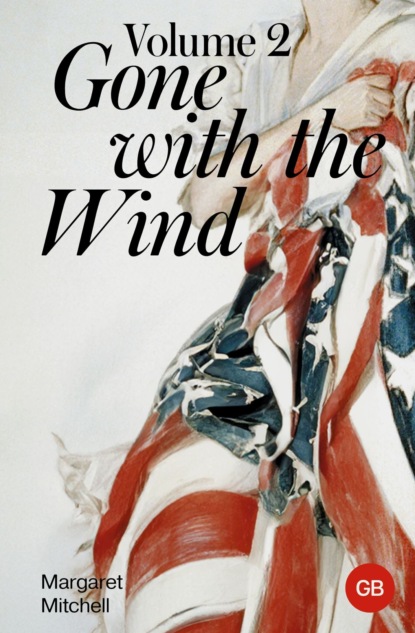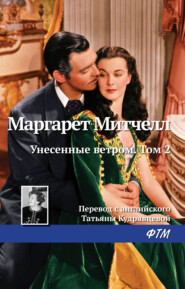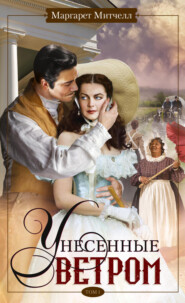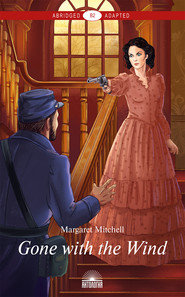По всем вопросам обращайтесь на: info@litportal.ru
(©) 2003-2024.
✖
Gone with the Wind. Volume 2 / Унесенные ветром. Том 2
Настройки чтения
Размер шрифта
Высота строк
Поля
Gone with the Wind. Volume 2 / Унесенные ветром. Том 2
Margaret Munnerlyn Mitchell
Great books
Война забрала у Скарлетт семью, деньги и возлюбленный юг ее юности – но сломить ее? Нет, этого не случится. Скарлетт будет врать, мошенничать и плести интриги против самых близких, она наймет заключенных вместо рабов и выйдет замуж за любого, чьих средств хватит, чтобы обеспечивать ее и ее амбиции. Скарлетт преследует только две цели: любовь Эшли и богатство. И Ретт Батлер – лишь ступенька на пути к исполнению ее американской мечты.
Ведь так?
«Унесенные ветром» – роман-бестселлер, который принес Маргарет Митчелл мировую славу и Пулитцеровскую премию. Книга легла в основу одноименного фильма 1937 года, признанного самым кассовым в истории кинематографа.
Маргарет Митчелл
Gone with the Wind. Volume 2 / Унесенные ветром. Том 2
© ООО «Издательство АСТ», 2024
Part Four
Chapter XXXI
On a cold January afternoon in 1866, Scarlett sat in the office writing a letter to Aunt Pitty, explaining in detail for the tenth time why neither she, Melanie nor Ashley could come back to Atlanta to live with her. She wrote impatiently because she knew Aunt Pitty would read no farther than the opening lines and then write her again, wailing: “But I'm afraid to live by myself!”
Her hands were chilled and she paused to rub them together and to scuff her feet deeper into the strip of old quilting wrapped about them. The soles of her slippers were practically gone and were reinforced with pieces of carpet. The carpet kept her feet off the floor but did little to keep them warm. That morning Will had taken the horse to Jonesboro to get him shod. Scarlett thought grimly that things were indeed at a pretty pass when horses had shoes and people's feet were as bare as yard dogs'.
She picked up her quill to resume her writing but laid it down when she heard Will coming in at the back door. She heard the thump- thump of his wooden leg in the hall outside the office and then he stopped. She waited for a moment for him to enter and when he made no move she called to him. He came in, his ears red from the cold, his pinkish hair awry, and stood looking down at her, a faintly humorous smile on his lips.
“Miss Scarlett,” he questioned, “just how much cash money have you got?”
“Are you going to try to marry me for my money, Will?” she asked somewhat crossly.
“No, Ma'm. But I just wanted to know.”
She stared at him inquiringly. Will didn't look serious, but then he never looked serious. However, she felt that something was wrong.
“I've got ten dollars in gold,” she said. “The last of that Yankee's money.”
“Well, Ma'm, that won't be enough.”
“Enough for what?”
“Enough for the taxes,” he answered and, stumping over to the fireplace, he leaned down and held his red hands to the blaze.
“Taxes?” she repeated. “Name of God, Will! We've already paid the taxes.”
“Yes'm. But they say you didn't pay enough. I heard about it today over to Jonesboro.”
“But, Will, I can't understand. What do you mean?”
“Miss Scarlett, I sure hate to bother you with more trouble when you've had your share but I've got to tell you. They say you ought to paid lots more taxes than you did. They're runnin' the assessment up on Tara sky high-higher than any in the County, I'll be bound.”
“But they can't make us pay more taxes when we've already paid them once.”
“Miss Scarlett, you don't never go to Jonesboro often and I'm glad you don't. It ain't no place for a lady these days. But if you'd been there much, you'd know there's a mighty rough bunch of Scallawags and Republicans and Carpetbaggers been runnin' things recently. They'd make you mad enough to pop. And then, too, niggers pushin' white folks off the sidewalks and-”
“But what's that got to do with our taxes?”
“I'm gettin' to it, Miss Scarlett. For some reason the rascals have histed the taxes on Tara till you'd think it was a thousand-bale place. After I heard about it, I sorter oozed around the barrooms pickin' up gossip and I found out that somebody wants to buy in Tara cheap at the sheriff's sale, if you can't pay the extra taxes. And everybody knows pretty well that you can't pay them. I don't know yet who it is wants this place. I couldn't find out. But I think that pusillanimous feller, Hilton, that married Miss Cathleen knows, because he laughed kind of nasty when I tried to sound him out.”
Will sat down on the sofa and rubbed the stump of his leg. It ached in cold weather and the wooden peg was neither well padded nor comfortable. Scarlett looked at him wildly. His manner was so casual when he was sounding the death knell of Tara. Sold out at the sheriff's sale? Where would they all go? And Tara belonging to some one else! No, that was unthinkable!
She had been so engrossed with the job of making Tara produce she had paid little heed to what was going on in the world outside. Now that she had Will and Ashley to attend to whatever business she might have in Jonesboro and Fayetteville, she seldom left the plantation. And even as she had listened with deaf ears to her father's war talk in the days before the war came, so she had paid little heed to Will and Ashley's discussions around the table after supper about the beginnings of Reconstruction.
Oh, of course, she knew about the Scallawags-Southerners who had turned Republican very profitably-and the Carpetbaggers, those Yankees who came South like buzzards after the surrender with all their worldly possessions in one carpetbag. And she had had a few unpleasant experiences with the Freedmen's Bureau. She had gathered, also, that some of the free negroes were getting quite insolent. This last she could hardly believe, for she had never seen an insolent negro in her life.
But there were many things which Will and Ashley had conspired to keep from her. The scourge of war had been followed by the worse scourge of Reconstruction, but the two men had agreed not to mention the more alarming details when they discussed the situation at home. And when Scarlett took the trouble to listen to them at all, most of what they said went in one ear and out the other.
She had heard Ashley say that the South was being treated as a conquered province and that vindictiveness was the dominant policy of the conquerors. But that was the kind of statement which meant less than nothing at all to Scarlett. Politics was men's business. She had heard Will say it looked to him like the North just wasn't aiming to let the South get on its feet again. Well, thought Scarlett, men always had to have something foolish to worry about. As far as she was concerned, the Yankees hadn't whipped her once and they wouldn't do it this time. The thing to do was to work like the devil and stop worrying about the Yankee government. After all, the war was over.
Scarlett did not realize that all the rules of the game had been changed and that honest labor could no longer earn its just reward. Georgia was virtually under martial law now. The Yankee soldiers garrisoned throughout the section and the Freedmen's Bureau were in complete command of everything and they were fixing the rules to suit themselves.
This Bureau, organized by the Federal government to take care of the idle and excited ex-slaves, was drawing them from the plantations into the villages and cities by the thousands. The Bureau fed them while they loafed and poisoned their minds against their former owners. Gerald's old overseer, Jonas Wilkerson, was in charge of the local Bureau, and his assistant was Hilton, Cathleen Calvert's husband. These two industriously spread the rumor that the Southerners and Democrats were just waiting for a good chance to put the negroes back into slavery and that the negroes' only hope of escaping this fate was the protection given them by the Bureau and the Republican party.
Wilkerson and Hilton furthermore told the negroes they were as good as the whites in every way and soon white and negro marriages would be permitted, soon the estates of their former owners would be divided and every negro would be given forty acres and a mule for his own. They kept the negroes stirred up with tales of cruelty perpetrated by the whites and, in a section long famed for the affectionate relations between slaves and slave owners, hate and suspicion began to grow.
The Bureau was backed up by the soldiers and the military had issued many and conflicting orders governing the conduct of the conquered. It was easy to get arrested, even for snubbing the officials of the Bureau. Military orders had been promulgated concerning the schools, sanitation, the kind of buttons one wore on one's suit, the sale of commodities and nearly everything else. Wilkerson and Hilton had the power to interfere in any trade Scarlett might make and to fix their own prices on anything she sold or swapped.
Fortunately Scarlett had come into contact with the two men very little, for Will had persuaded her to let him handle the trading while she managed the plantation. In his mild-tempered way, Will had straightened out several difficulties of this kind and said nothing to her about them. Will could get along with Carpetbaggers and Yankees-if he had to. But now a problem had arisen which was too big for him to handle. The extra tax assessment and the danger of losing Tara were matters Scarlett had to know about-and right away.
She looked at him with flashing eyes.
“Oh, damn the Yankees!” she cried. “Isn't it enough that they've licked us and beggared us without turning loose scoundrels on us?”
The war was over, peace had been declared, but the Yankees could still rob her, they could still starve her, they could still drive her from her house. And fool that she was, she had thought through weary months that if she could just hold out until spring, everything would be all right. This crushing news brought by Will, coming on top of a year of back-breaking work and hope deferred, was the last straw.
“Oh, Will, and I thought our troubles were all over when the war ended!”
“No'm.” Will raised his lantern-jawed, country-looking face and gave her a long steady look. “Our troubles are just gettin' started.”
“How much extra taxes do they want us to pay?”
“Three hundred dollars.”
She was struck dumb for a moment. Three hundred dollars! It might just as well be three million dollars.
“Why,” she floundered, “why-why, then we've got to raise three hundred, somehow.”
“Yes'm-and a rainbow and a moon or two.”
“Oh, but Will! They couldn't sell out Tara. Why-”
Margaret Munnerlyn Mitchell
Great books
Война забрала у Скарлетт семью, деньги и возлюбленный юг ее юности – но сломить ее? Нет, этого не случится. Скарлетт будет врать, мошенничать и плести интриги против самых близких, она наймет заключенных вместо рабов и выйдет замуж за любого, чьих средств хватит, чтобы обеспечивать ее и ее амбиции. Скарлетт преследует только две цели: любовь Эшли и богатство. И Ретт Батлер – лишь ступенька на пути к исполнению ее американской мечты.
Ведь так?
«Унесенные ветром» – роман-бестселлер, который принес Маргарет Митчелл мировую славу и Пулитцеровскую премию. Книга легла в основу одноименного фильма 1937 года, признанного самым кассовым в истории кинематографа.
Маргарет Митчелл
Gone with the Wind. Volume 2 / Унесенные ветром. Том 2
© ООО «Издательство АСТ», 2024
Part Four
Chapter XXXI
On a cold January afternoon in 1866, Scarlett sat in the office writing a letter to Aunt Pitty, explaining in detail for the tenth time why neither she, Melanie nor Ashley could come back to Atlanta to live with her. She wrote impatiently because she knew Aunt Pitty would read no farther than the opening lines and then write her again, wailing: “But I'm afraid to live by myself!”
Her hands were chilled and she paused to rub them together and to scuff her feet deeper into the strip of old quilting wrapped about them. The soles of her slippers were practically gone and were reinforced with pieces of carpet. The carpet kept her feet off the floor but did little to keep them warm. That morning Will had taken the horse to Jonesboro to get him shod. Scarlett thought grimly that things were indeed at a pretty pass when horses had shoes and people's feet were as bare as yard dogs'.
She picked up her quill to resume her writing but laid it down when she heard Will coming in at the back door. She heard the thump- thump of his wooden leg in the hall outside the office and then he stopped. She waited for a moment for him to enter and when he made no move she called to him. He came in, his ears red from the cold, his pinkish hair awry, and stood looking down at her, a faintly humorous smile on his lips.
“Miss Scarlett,” he questioned, “just how much cash money have you got?”
“Are you going to try to marry me for my money, Will?” she asked somewhat crossly.
“No, Ma'm. But I just wanted to know.”
She stared at him inquiringly. Will didn't look serious, but then he never looked serious. However, she felt that something was wrong.
“I've got ten dollars in gold,” she said. “The last of that Yankee's money.”
“Well, Ma'm, that won't be enough.”
“Enough for what?”
“Enough for the taxes,” he answered and, stumping over to the fireplace, he leaned down and held his red hands to the blaze.
“Taxes?” she repeated. “Name of God, Will! We've already paid the taxes.”
“Yes'm. But they say you didn't pay enough. I heard about it today over to Jonesboro.”
“But, Will, I can't understand. What do you mean?”
“Miss Scarlett, I sure hate to bother you with more trouble when you've had your share but I've got to tell you. They say you ought to paid lots more taxes than you did. They're runnin' the assessment up on Tara sky high-higher than any in the County, I'll be bound.”
“But they can't make us pay more taxes when we've already paid them once.”
“Miss Scarlett, you don't never go to Jonesboro often and I'm glad you don't. It ain't no place for a lady these days. But if you'd been there much, you'd know there's a mighty rough bunch of Scallawags and Republicans and Carpetbaggers been runnin' things recently. They'd make you mad enough to pop. And then, too, niggers pushin' white folks off the sidewalks and-”
“But what's that got to do with our taxes?”
“I'm gettin' to it, Miss Scarlett. For some reason the rascals have histed the taxes on Tara till you'd think it was a thousand-bale place. After I heard about it, I sorter oozed around the barrooms pickin' up gossip and I found out that somebody wants to buy in Tara cheap at the sheriff's sale, if you can't pay the extra taxes. And everybody knows pretty well that you can't pay them. I don't know yet who it is wants this place. I couldn't find out. But I think that pusillanimous feller, Hilton, that married Miss Cathleen knows, because he laughed kind of nasty when I tried to sound him out.”
Will sat down on the sofa and rubbed the stump of his leg. It ached in cold weather and the wooden peg was neither well padded nor comfortable. Scarlett looked at him wildly. His manner was so casual when he was sounding the death knell of Tara. Sold out at the sheriff's sale? Where would they all go? And Tara belonging to some one else! No, that was unthinkable!
She had been so engrossed with the job of making Tara produce she had paid little heed to what was going on in the world outside. Now that she had Will and Ashley to attend to whatever business she might have in Jonesboro and Fayetteville, she seldom left the plantation. And even as she had listened with deaf ears to her father's war talk in the days before the war came, so she had paid little heed to Will and Ashley's discussions around the table after supper about the beginnings of Reconstruction.
Oh, of course, she knew about the Scallawags-Southerners who had turned Republican very profitably-and the Carpetbaggers, those Yankees who came South like buzzards after the surrender with all their worldly possessions in one carpetbag. And she had had a few unpleasant experiences with the Freedmen's Bureau. She had gathered, also, that some of the free negroes were getting quite insolent. This last she could hardly believe, for she had never seen an insolent negro in her life.
But there were many things which Will and Ashley had conspired to keep from her. The scourge of war had been followed by the worse scourge of Reconstruction, but the two men had agreed not to mention the more alarming details when they discussed the situation at home. And when Scarlett took the trouble to listen to them at all, most of what they said went in one ear and out the other.
She had heard Ashley say that the South was being treated as a conquered province and that vindictiveness was the dominant policy of the conquerors. But that was the kind of statement which meant less than nothing at all to Scarlett. Politics was men's business. She had heard Will say it looked to him like the North just wasn't aiming to let the South get on its feet again. Well, thought Scarlett, men always had to have something foolish to worry about. As far as she was concerned, the Yankees hadn't whipped her once and they wouldn't do it this time. The thing to do was to work like the devil and stop worrying about the Yankee government. After all, the war was over.
Scarlett did not realize that all the rules of the game had been changed and that honest labor could no longer earn its just reward. Georgia was virtually under martial law now. The Yankee soldiers garrisoned throughout the section and the Freedmen's Bureau were in complete command of everything and they were fixing the rules to suit themselves.
This Bureau, organized by the Federal government to take care of the idle and excited ex-slaves, was drawing them from the plantations into the villages and cities by the thousands. The Bureau fed them while they loafed and poisoned their minds against their former owners. Gerald's old overseer, Jonas Wilkerson, was in charge of the local Bureau, and his assistant was Hilton, Cathleen Calvert's husband. These two industriously spread the rumor that the Southerners and Democrats were just waiting for a good chance to put the negroes back into slavery and that the negroes' only hope of escaping this fate was the protection given them by the Bureau and the Republican party.
Wilkerson and Hilton furthermore told the negroes they were as good as the whites in every way and soon white and negro marriages would be permitted, soon the estates of their former owners would be divided and every negro would be given forty acres and a mule for his own. They kept the negroes stirred up with tales of cruelty perpetrated by the whites and, in a section long famed for the affectionate relations between slaves and slave owners, hate and suspicion began to grow.
The Bureau was backed up by the soldiers and the military had issued many and conflicting orders governing the conduct of the conquered. It was easy to get arrested, even for snubbing the officials of the Bureau. Military orders had been promulgated concerning the schools, sanitation, the kind of buttons one wore on one's suit, the sale of commodities and nearly everything else. Wilkerson and Hilton had the power to interfere in any trade Scarlett might make and to fix their own prices on anything she sold or swapped.
Fortunately Scarlett had come into contact with the two men very little, for Will had persuaded her to let him handle the trading while she managed the plantation. In his mild-tempered way, Will had straightened out several difficulties of this kind and said nothing to her about them. Will could get along with Carpetbaggers and Yankees-if he had to. But now a problem had arisen which was too big for him to handle. The extra tax assessment and the danger of losing Tara were matters Scarlett had to know about-and right away.
She looked at him with flashing eyes.
“Oh, damn the Yankees!” she cried. “Isn't it enough that they've licked us and beggared us without turning loose scoundrels on us?”
The war was over, peace had been declared, but the Yankees could still rob her, they could still starve her, they could still drive her from her house. And fool that she was, she had thought through weary months that if she could just hold out until spring, everything would be all right. This crushing news brought by Will, coming on top of a year of back-breaking work and hope deferred, was the last straw.
“Oh, Will, and I thought our troubles were all over when the war ended!”
“No'm.” Will raised his lantern-jawed, country-looking face and gave her a long steady look. “Our troubles are just gettin' started.”
“How much extra taxes do they want us to pay?”
“Three hundred dollars.”
She was struck dumb for a moment. Three hundred dollars! It might just as well be three million dollars.
“Why,” she floundered, “why-why, then we've got to raise three hundred, somehow.”
“Yes'm-and a rainbow and a moon or two.”
“Oh, but Will! They couldn't sell out Tara. Why-”

















